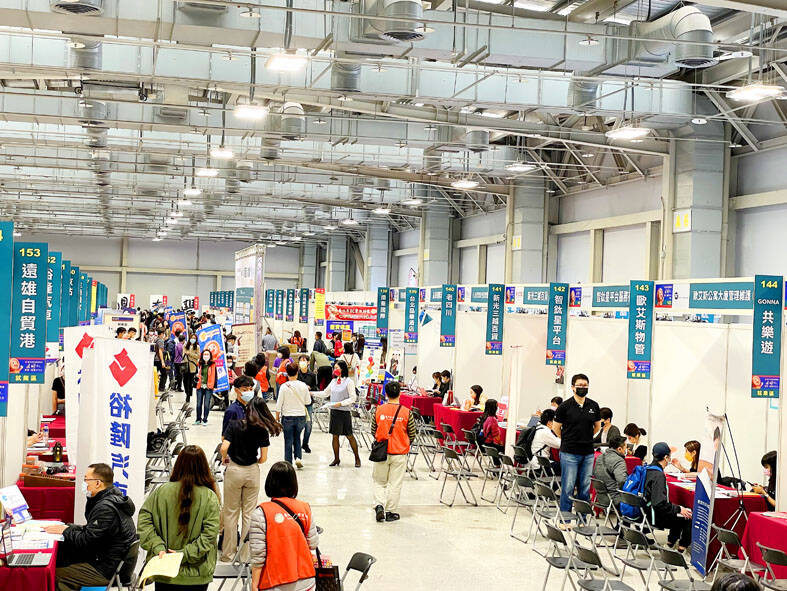Most jobseekers are interested in joining tech companies even though global technology titans are shedding headcounts to cope with a market downcycle, the online 1111 Job Bank (1111人力銀行) said yesterday.
The job bank said it made the observation after an internal survey found that 58.8 percent of respondents intend to work for tech companies and 14 percent have landed positions.
That means almost 73 percent favored jobs in the tech sector, with only 27.2 percent looking for occupations in other fields, the survey showed.

Photo: Tsai Ya-hua, Taipei Times
The results came even though global technology firms are downsizing payrolls and local companies in their supply chains are going through inventory corrections, it said.
High salaries and compensation packages were the main reason for the occupation preference at 72.3 percent, followed by better perks at 53.2 percent, a rosy outlook for the sector at 49.5 percent and expectations of year-end bonuses at 39.4 percent, it said, adding that upward mobility also played an important role at 19.1 percent.
The job preference appears unaffected by the fact that global technology firms laid off 168,582 people in the first quarter, more than for the whole of last year, 1111 Job Bank said.
Still, there are 674,000 vacant positions available in Taiwan, with 70,000 of them in the tech sector, a 16.6 percent advance compared with three months earlier, the job bank said.
The data show that demand for personnel remains strong in the technology industry, it said.

UNCERTAINTY: Innolux activated a stringent supply chain management mechanism, as it did during the COVID-19 pandemic, to ensure optimal inventory levels for customers Flat-panel display makers AUO Corp (友達) and Innolux Corp (群創) yesterday said that about 12 to 20 percent of their display business is at risk of potential US tariffs and that they would relocate production or shipment destinations to mitigate the levies’ effects. US tariffs would have a direct impact of US$200 million on AUO’s revenue, company chairman Paul Peng (彭雙浪) told reporters on the sidelines of the Touch Taiwan trade show in Taipei yesterday. That would make up about 12 percent of the company’s overall revenue. To cope with the tariff uncertainty, AUO plans to allocate its production to manufacturing facilities in

Taiwan will prioritize the development of silicon photonics by taking advantage of its strength in the semiconductor industry to build another shield to protect the local economy, National Development Council (NDC) Minister Paul Liu (劉鏡清) said yesterday. Speaking at a meeting of the legislature’s Economics Committee, Liu said Taiwan already has the artificial intelligence (AI) industry as a shield, after the semiconductor industry, to safeguard the country, and is looking at new unique fields to build more economic shields. While Taiwan will further strengthen its existing shields, over the longer term, the country is determined to focus on such potential segments as

TAKING STOCK: A Taiwanese cookware firm in Vietnam urged customers to assess inventory or place orders early so shipments can reach the US while tariffs are paused Taiwanese businesses in Vietnam are exploring alternatives after the White House imposed a 46 percent import duty on Vietnamese goods, following US President Donald Trump’s announcement of “reciprocal” tariffs on the US’ trading partners. Lo Shih-liang (羅世良), chairman of Brico Industry Co (裕茂工業), a Taiwanese company that manufactures cast iron cookware and stove components in Vietnam, said that more than 40 percent of his business was tied to the US market, describing the constant US policy shifts as an emotional roller coaster. “I work during the day and stay up all night watching the news. I’ve been following US news until 3am

COLLABORATION: Given Taiwan’s key position in global supply chains, the US firm is discussing strategies with local partners and clients to deal with global uncertainties Advanced Micro Devices Inc (AMD) yesterday said it is meeting with local ecosystem partners, including Taiwan Semiconductor Manufacturing Co (TSMC, 台積電), to discuss strategies, including long-term manufacturing, to navigate uncertainties such as US tariffs, as Taiwan occupies an important position in global supply chains. AMD chief executive officer Lisa Su (蘇姿丰) told reporters that Taiwan is an important part of the chip designer’s ecosystem and she is discussing with partners and customers in Taiwan to forge strong collaborations on different areas during this critical period. AMD has just become the first artificial-intelligence (AI) server chip customer of TSMC to utilize its advanced